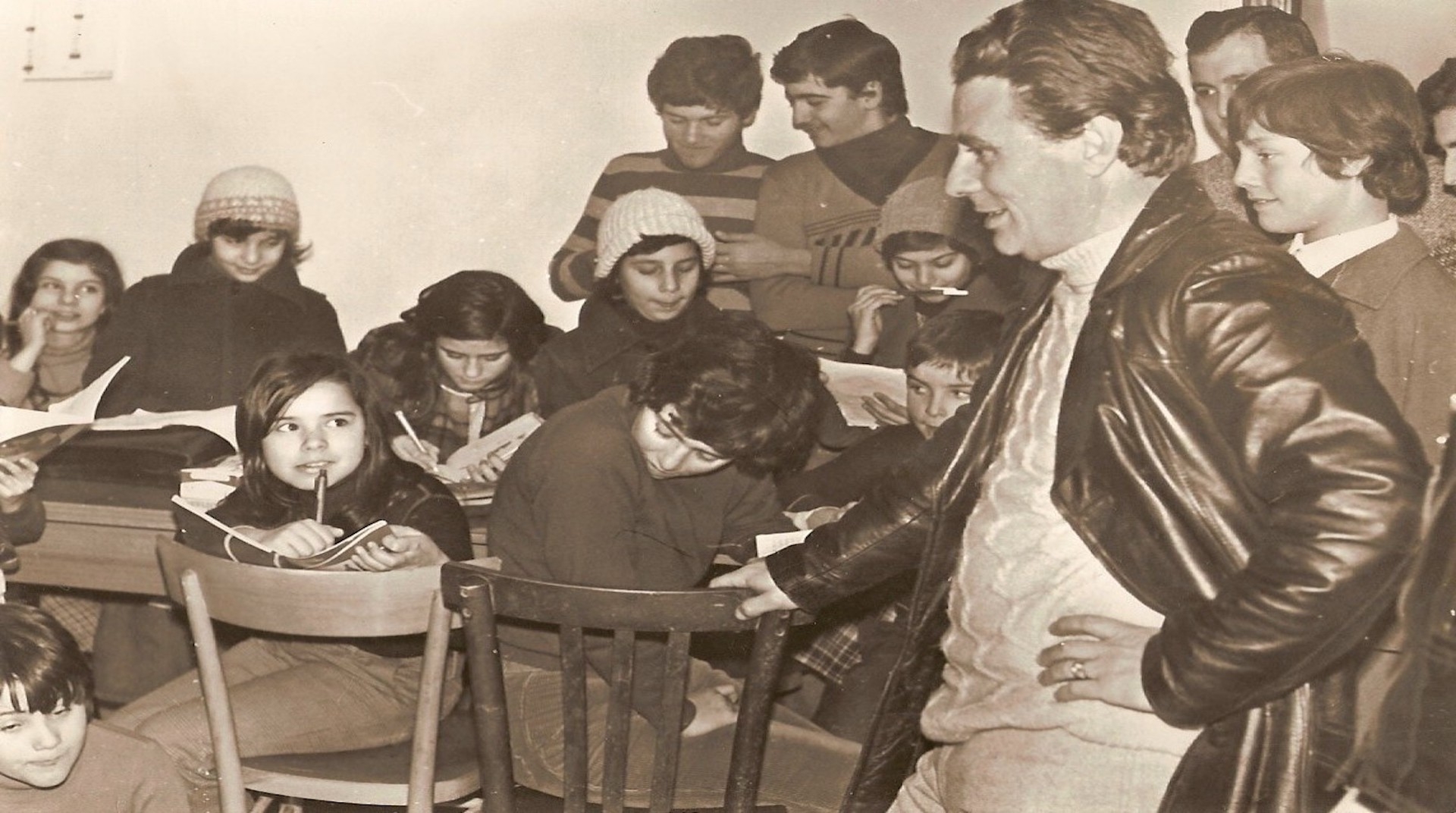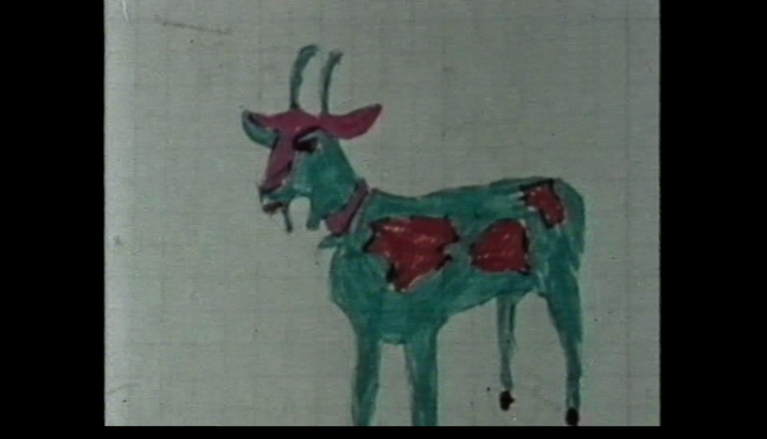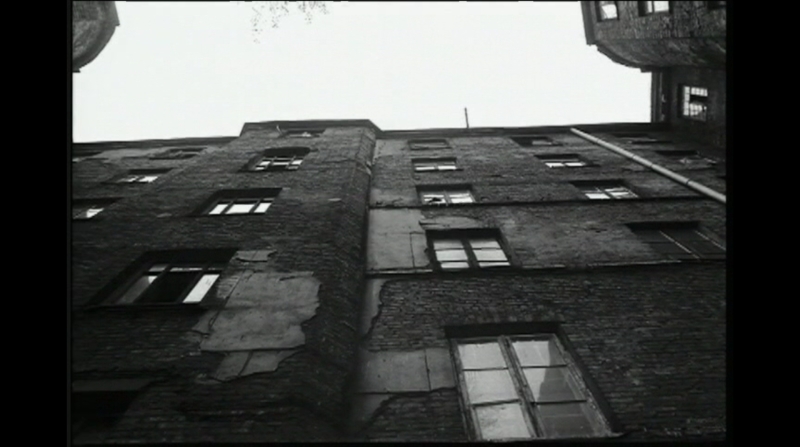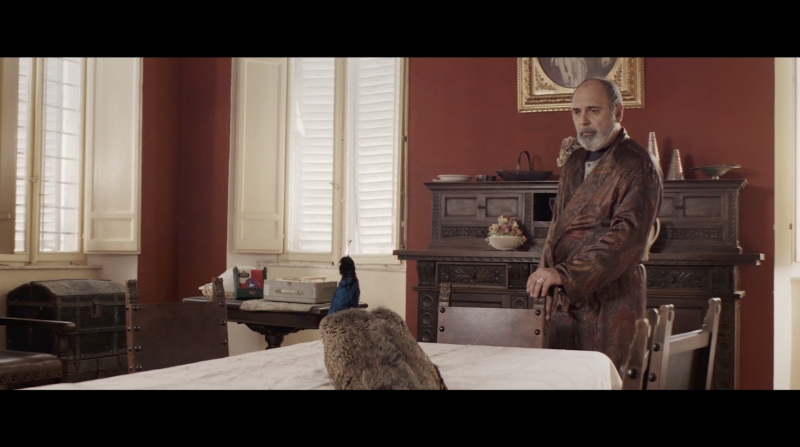(...) After Diary of A Teacher, I travelled for 20,000 km across Italy. From Gemona to Danilo Dolci. Some would say that the ‘teacher’ was a fake, then I would show that some of them existed for real. I was in two situations in the north and two in the south. And I was surprised to find out that the Diary of A Teacher-method was already adopted in so many schools. (...) It was normally difficult for the teacher to refer to the kids’ culture: in my opinion, there is 50% of objective difficulties, and another 50% of subjective, psychological difficulties – totally justifiable ones when you are supposed to reverse the principle of authority. The principle of notion is exported in a school that produces culture, that does not convey it. It’s a big thing, not supported by training courses on active schooling, and therefore the teachers do not know where to begin. (...) There’s always talk of the transition from school to society (...) whereas based on how society works today, conveying culture into school is difficult. Obviously, some change ought to happen, but it can take place in a microscopic, slow way, with the initiative of so many teachers who may not even be communicating with each other, instead of waiting for provisions from above.
Vittorio De Seta is part of a generation of men and women with different experiences and from different life and work backgrounds who have laid down the foundations of an Italy that could have been poles apart from the current one. Let’s try and draw a quick (surely incomplete) list: De Seta was born in 1923, like Lorenzo Milani and Bruno Ciari; Mario Lodi (the protagonist of one of the four documentaries from the series Quando la scuola cambia, presented at PFF 2022) and Giuseppe Tamagnini were born in 1922; Giovanna Legatti in 1921; 1920 was the birth year of Gianni Rodari, Loris Malaguzzi, and Adriano Milani Comparetti (the elder brother of neuropsychiatrist Lorenzo, among the first in Italy to deal with open-mindedness with disabled persons – those that De Seta discusses in I diversi – with well-developed theories and practical actions that were to be the core of the enlightened 1977 Law n. 217, abolishing special-needs classrooms); Franco Basaglia, Giulio Alfredo Maccacaro, and Danilo Dolci were born in 1924; and Carmine de Padova in 1928 (pictured in another documentary of the series, Tutti i cittadini sono uguali senza distinzione di lingua).
As all of them were born in the years when Fascism was taking over, they also shared a regime school education and, at least some of them, antifascist, Resistance experiences. Vittorio De Seta, a navy officer, refuses to join the Social Republic of Salò and is deported to Germany from 1943 to 1945. Mario Lodi is arrested and put to jail on the charge of having sabotaged the railway line. Gianni Rodari joins the partisan fight. Franco Basaglia spends some months in the Social Republic’s prisons. Danilo Dolci is arrested in Genoa, manages to break out and hides in Abruzzo, sheltered by a family of shepherds. Giulio Maccararo (who was to become a medical doctor and to father modern, avant-garde occupational health care in Italy) takes part in the Resistance with the Barni Brigade in the Oltrepo Pavese partisan forces.
De Seta would demur, asserting that he had made Diary of A Teacher because he had to work and make a living, but it’s not a coincidence that this kind of experiences were acknowledged as a shared legacy of regeneration and reconstruction of a Country undermined by dictatorship and war.
Diary of A Teacher was acclaimed by the audience, with fifteen million viewers for each episode. The point of the four-episode investigative report – bound to prove and show that this kind of school did exist and proliferate, according to the Sicilian film director’s project submitted to Rai – was precisely to answer the criticism of those who objected that the school he portrayed did not really exist (a teacher who does not sit at his desk, children who don’t stay in the classroom and go on field trips to gather open-air scientific observations instead of studying in the books, etc.).
The first three episodes (‘starring’ respectively Mario Lodi, Carmine De Padova, and Caterina Foschi Pini) were broadcast on April 10, 17, and 24, 1979. The fourth, which dealt with the Cutrofiano association for spastic persons, province of Lecce, was broadcast later, within the show Scatola aperta.
Partire dal bambino (Departing from the child) is a record of Mario Lodi’s experience in Vho di Piadena, filming his work with a fourth-grade class, his last before retiring.
Tutti i cittadini sono uguali senza distinzione di lingua (All citizens are equal without distinction of language) is dedicated to the figure of Master Carmine De Padova, who managed to keep alive Arbëresh traditions in San Marzano di San Giuseppe, a village close to Taranto and one of Italy’s linguistic islands, conducting afterschool education at home, inviting young and old over.
Lavorare insieme non stanca (Labour together is not hard) illustrates the work of teacher Caterina Foschi Pini in an experimental school in the Gorla neighbourhood of Milan, where little girls and little boys perform activities in their classroom, inter-classroom (where they pursue practical activities), and communal ones (sharing each other’s experiences). I diversi (The different ones) tells the story of the inclusion of children with disabilities who until the sixties were taken to Institutes and psycho-educational health centres that tended to isolate them and to substitute the original families. This habit was questioned head-on in the following decade thanks to the joint initiative of parents and carers, until the pioneering, generative experience at schools in the province of Lecce contributed to their insertion.
These four precious documentaries are at once part of film history (i.e., major documentary cinema like that of Vittorio De Seta, with the help of a great cinematographer such as Luciano Tovoli) and of the history of schooling, also mentioning the collaboration and advice of Francesco Tonucci as was the case with Diary.
To conclude with the words of De Seta, again:
“Quando la scuola cambia (When school changes) was the true story of four teachers who did this type of schooling normally, to prove that it can be done, that it wasn’t just a film game, but a reality that is sadly not yet very widespread even though active schooling has precedents, with sixty-seventy years of history, and if one really wants it can be done. However, I believe that the State, the ruling classes, do not want this schooling because they do not want free people, capable of entertaining opinions, children educated in this sense – they want schooling based on superficial factual knowledge that coerces people since their childhood, so maybe they later become good consumers, good voters, everything but people who think with their own mind.”
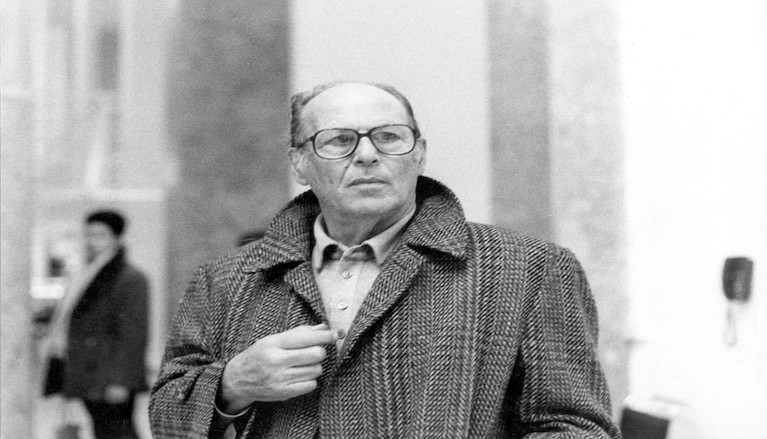
Vittorio De Seta was born into a noble Calabrian family, in Palermo on October 15, 1923, in one of the buildings of the historic Kalsa district that bears the name of his family. During the Second World War he was a cadet at the Naval Academy of Leghorn. After September 8, 1943 he was imprisoned in a German concentration camp near Salzburg because he refused to sign the act of loyalty towards the Social Republic of Salò; he tried to escape three times. He was freed in 1945 by the Russians who arrived in Vienna.
He attended the School of Architecture in Rome, but interrupted his university studies to devote himself to cinema. After working as an assistant film director for a few years, in the second half of the fifties he set up his own crew, which included his wife, Vera Gherarducci. With them, he made ten short documentaries as an independent. Being strongly innovative in style and content, the films contributed to his becoming one of the greatest Italian directors. De Seta depicts the life and fatigue of the southern proletariat with delicate and enthralling images: peasants, fishermen, sulphur miners, shepherds, thus immortalizing those forms of archaic culture. He was the first Italian director to use colour and the Cinemascope format in documentaries. De Seta can be considered one of the first examples of filmmaker of Italian cinema, since he personally took care of the cinematography, editing, and soundtrack of his films.
In 1961, he made his first feature in Barbagia, Sardinia, taking inspiration from Franco Cagnetta’s essay Inchiesta ad Orgosolo: Bandits of Orgosolo, that went on to win the prize for best debut at the Venice Film Festival. A sharp film director, he was highly esteemed by Pasolini and Moravia; he also worked with Tonino Guerra. The early seventies saw the beginning of a long collaboration with RAI, for which he made ‘revolutionary’ TV shows, such as Diary of A Teacher (1973), an acclaimed sceneggiato (mini-series) starring Bruno Cirino based on the book Un anno a Pietralata by Albino Bernardini; Quando la scuola cambia (1978), a TV investigative documentary in four episodes about the Italian school of those years. In 2005, the Full Frame Documentary Film Festival and the Tribeca Film Festival promoted by Robert De Niro and Martin Scorsese dedicated a tribute to De Seta, one for his documentary production, the other with greater attention to feature films.
He passed away on November 28, 2011 at the age of 88.
ALL SCREENINGS ARE FREE
